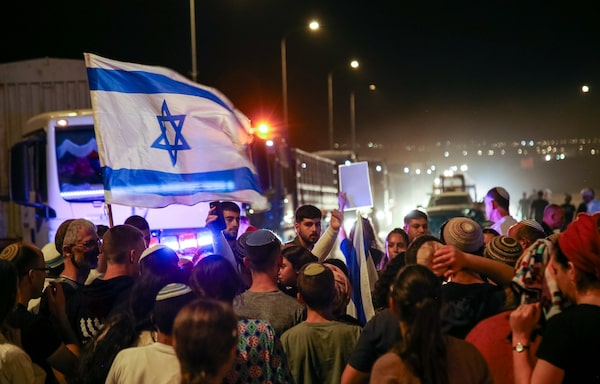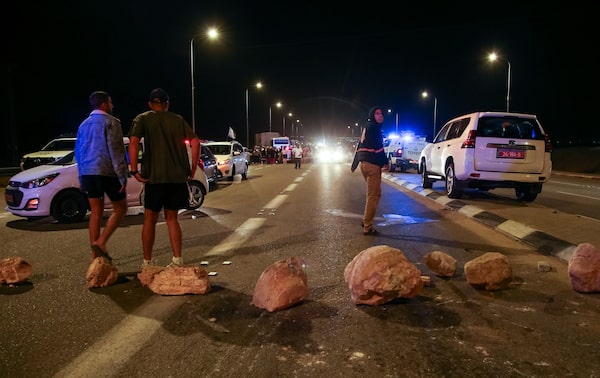
Protesters gather overnight in Tel Arad to block aid trucks from travelling to Jordan.Nathan VanderKlippe/The Globe and Mail
The WhatsApp messages began to circulate around 5:30 p.m. A new aid convoy was on its way from Jordan, filled with goods for Gaza. The trucks would likely arrive around 11 p.m. That was the time to be ready, wrote Reut Ben Haim, leader of a group that has become a digital command centre for Israelis who have made it their business to impede the transport of help to Palestinians.
Over the next few hours, a flurry of messages tracked the convoy’s arrival – and the operation to halt its westward journey from the Dead Sea.
First, cars pulled out in front of the trucks, slowing their highway speed to 40 kilometres an hour. When the convoy’s chosen route became clear, people on the ground were directed to a dusty intersection in the desert of southern Israel. Within minutes, dozens had taken position on the road, some waving flags, some pushing into place a barrier of stones.
The convoy, which one person measured at 1.4 kilometres in length, ground to a halt a few minutes before midnight Wednesday. Unmoving headlights stretched far into the distance behind the demonstrators, who faulted Israeli authorities for allowing aid to cross their land.
“We are giving our enemy oxygen to live,” said Roi Raphael, 27, a civil engineering student.
The sight of dozens of aid trucks idling in the dark – with police, for hours, doing little to intervene – offered a particularly striking illustration of the lengths some in Israel have been willing to go to oppose those they see as foes. Numerous blockades like it have been staged since the early days of the war; Yihai Feldman, a reservist who spent four months in Gaza, said he had personally been to a half-dozen.
Inside Gaza, international agencies say, more than a million people have fallen into catastrophic hunger. Famine is imminent, the World Food Programme warned in March. Gazans have described to The Globe and Mail the death of newborns whose mothers were no longer able to produce milk, and of women too weak to survive childbirth.
Israeli officials have disputed famine warnings as exaggerations.
But in recent weeks, the country has eased constrictions on the flow of aid, particularly in the wake of an April 1 drone strike that killed seven workers for World Central Kitchen, one of them Canadian. Israel’s Co-ordinator of Government Activities in the Territories said this week that 150 to 200 trucks are now entering Gaza each day.
After months with so little food that many resorted to eating cattle fodder, the aid represents a critical lifeline. Outside of wild herbs, local sources of sustenance no longer exist in Gaza.

Protesters block the road with rocks in Tel Arad to prevent aid trucks from travelling to Jordan.Nathan VanderKlippe/The Globe and Mail
The new flows of aid are enough that people in the north of the strip, where shortages had been most acute, have reported the return of basic foodstuffs to markets, albeit at prices high enough that profound hunger remains. (Many have blamed profit-selling groups for hoarding goods.)
A small but determined group of Israelis, however, has sought to choke Gaza’s new aid lifeline by thwarting the movement of goods.
Those who joined the late-night blockade this week included a middle-school principal and his two daughters, men returning from a soccer match, teenage high-school students, an army reservist and Hadar Persoff, a 21-year-old university student who drove an hour and a half with her husband and two-month-old infant to join.
Ms. Persoff lives in Karnei Shomron, a large Israeli settlement in the West Bank. The truck blockade marked only the second time she had joined a political protest, she said. The first was against the 2013 demolition of four homes built on Palestinian-owned land. (Canada and many other countries consider Israel’s settlements a violation of international law.)
She believes that if people in Gaza were given their way with a settler like her, “they would kill me. And if they would kill me, why would I give them food?”
Decades of violence has claimed lives of both Israelis and Palestinians, although far more Palestinians have been killed.
For those seeking to block the trucks to Gaza, however, only one date matters: Oct. 7, when Hamas-led militants killed 1,200 in Israel and seized hundreds of hostages – 133 of whom have not returned.
Ms. Persoff nodded toward the lengthy queue of trucks idling behind the protesters. It was too much she said, to countenance Israeli roads being used to carry “all this food and sugar and oil and wood and things for construction – for Hamas to build?”
Critics say the blockades form part of a broader Israeli failure to care for Palestinians. “Humanitarian and international law requires ensuring the entry of food and medical aid to people under their occupation,” said Firas Yaghi, a former senior official with the Palestinian Legislative Council who is now a political analyst and expert in Israeli studies.
“The failure to hold Israel accountable for the humanitarian disasters it commits encourages these extremists to besiege the crossings to prevent aid from entering the Gaza Strip.”
Those at the blockade, however, said providing food amounts to feeding terror.
“The trucks represent weakness in front of Hamas, “said Reem Ben David, 16, whose parents dropped him off to join the blockade. “It starts with trucks, but it will lead to other things,” he said, warning that it will end with people in Gaza coming “back to shoot us.”
Police eventually arrested several demonstrators – but once trucks passed through the first blockade, a second formed down the road. It was not until after 6 a.m., with the sun clearing the horizon, that the trucks were able to proceed freely.
But the point had been made, said Shira Cohen, also 16, who came out with her 11-year-old sister and her father, David, a middle-school principal.
“It’s for the government and the world to see that this is the feeling in our country. This is what we as a people oppose,” she said. Israel is “at war,” she added. “And when you are at war you don’t help your enemy with your own money.”
Mr. Cohen sees two only acceptable options for hungry Palestinians. One is to turn against Hamas, the group that has ruled Gaza with military force.
The other is “to starve.”
 Nathan VanderKlippe
Nathan VanderKlippe